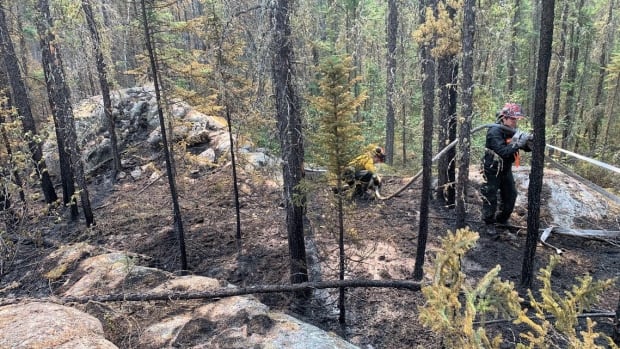
Efforts to evacuate Fort Chipewyan, a northeastern Alberta community threatened by wildfire, are being hampered by the hamlet’s isolated location.
About 1,000 people who live in Fort Chip, 300 kilometres northeast of Fort McMurray, were told Tuesday to leave their homes but getting everyone out will take time.
In the summer months, after the ice road melts, the hamlet is accessible only by plane or boat.
The evacuation is being done in stages by air and by river. Some people are being flown out to Fort McMurray. Others are travelling by boat, south along the Athabasca River.
The evacuation effort started with residents in Allison Bay, which is closest to the wildfire’s boundary.
Chief Allan Adam of the Athabasca Chipewyan First Nation said that by Tuesday evening, about 500 people had been evacuated from Fort Chipewyan.
He said all planes in the area were temporarily grounded Tuesday because of poor visibility.
Adam urged residents to remain calm and said additional air transportation was en route to the community. Remaining residents are expected to be transported out of Fort Chipewyan Wednesday.
“I want to thank everyone for the great work today. Thank you for the co-operation,” Adam said in a video posted to social media.
“We stuck together and we stayed calm and we looked out for one another. We just need to do this at the same time tomorrow and we will get all out to safety.”
As of Tuesday evening, the fire was burning about 13 kilometres from Fort Chipewyan but only four kilometres from Allison Bay, which is home to around 125 people.
First spotted on Sunday, the fire — believed to have been sparked by lightning — has already destroyed an estimated 3,000 hectares.
Officials with Alberta Wildfire said it is considered the No. 1 priority wildfire in the province and that additional crews were being dispatched to the front lines Wednesday. .
‘A hectic day’
Adam said a series of private and corporate charters, including a Hercules, will be involved in transporting residents to Fort McMurray.
He said the evacuation is being done by neighbourhood, with help from the RCMP. When it’s time for people to leave, they will be informed by a knock at the door.
“The fire only grew a little today, I saw it myself,” Adams said. “The winds are in our favour until Friday.
“It’s been a hectic day … but we will get the rest out tomorrow.”
The Regional Municipality of Wood Buffalo, Mikisew Cree First Nation, the Athabasca Chipewyan First Nation, and Fort Chipewyan Métis Nation issued the joint evacuation order and are working together to co-ordinate a response.
Billy-Joe Tuccaro, chief of the Mikisew Cree First Nation, said community leaders, along with provincial and municipal emergency officials, are pulling together to get everyone out.
Tuccaro posted a video to social media early Wednesday, thanking everyone involved.
“I am very grateful and I’m sure a lot of my people, as well as a lot of the community members, are appreciative of the support we got today,” he said. “Without everybody’s help, we wouldn’t have had the success we did.”
Kendrick Cardinal, president of the Fort Chipewyan Métis local, said community leaders have been in close contact with provincial officials, including Premier Danielle Smith.
He said the community is receiving aid from Alberta Wildfire and Canadian Armed Forces troops.
Temporary accommodations in Fort McMurray and Fort McKay are being arranged for evacuees.
Cardinal said he remains hopeful the community can be protected and thanked residents who will be remaining behind to aid in the wildfire fight.
He urged residents to abide the evacuation order and register as required so that leadership knows they made it out.
“I will be staying here until the bitter end,” Cardinal said.
“Material things can always be replaced. We just want to make sure everyone gets out safe, that nobody gets left behind.”
As of Wednesday morning, 67 wildfires are burning across Alberta. Of the 66 burning inside the province’s forest protection areas, 18 are burning out of control.